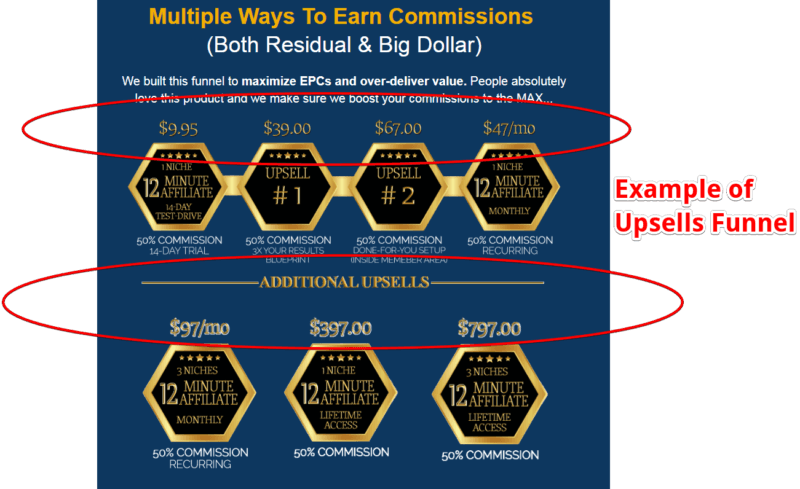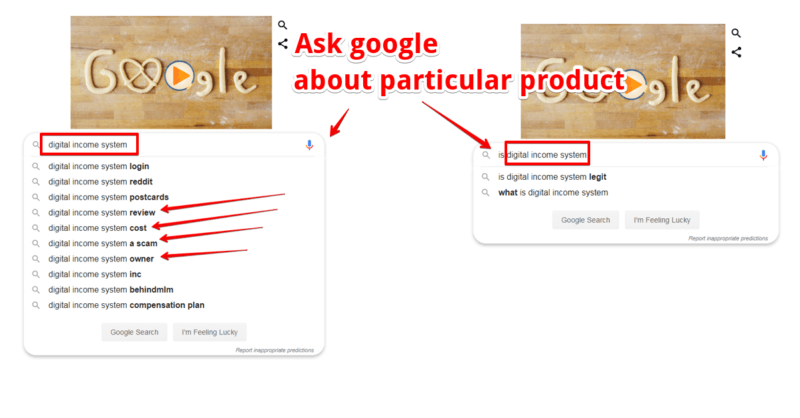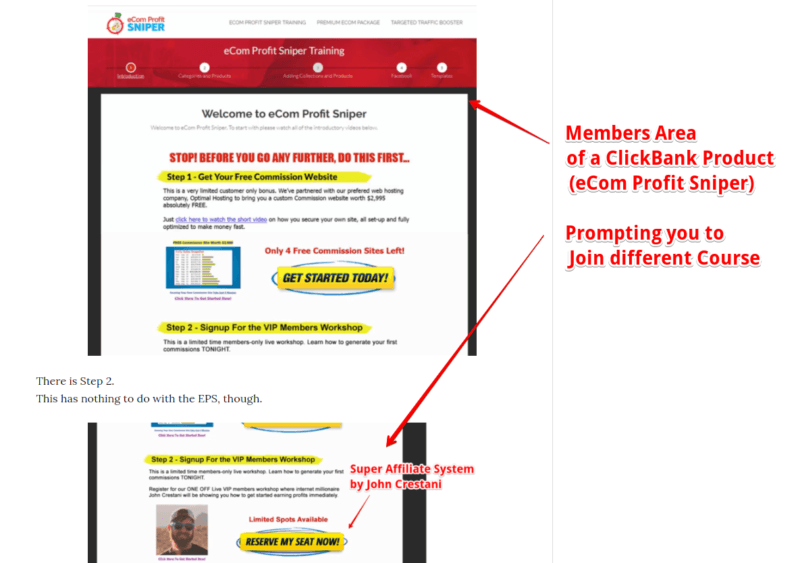Have you ever been scammed?
Or at least have you got close to being scammed?
I know I have.
Usually, this happens when we search for ways how to make money online. And I don’t mean by search only “googling”.
I mean search generally.
We see some sponsored ads on Facebook, we sign in. We see some gurus on YouTube so we sign in.
And, of course, actively search for courses and platforms in search engines as well (Google, Bing, Yahoo, etc)
The results we get can be very different. From total scams to some misleading products promising huge earnings, high ticket products, and legit courses as well. Sometimes it is not easy to determine what the scam is.
This post is about to make it clear (or at least clear).
What is an online scam?
We are going to cover the scam in the online world only, especially we will be focusing on digital courses, products, systems online, and so forth. (If you are interested in the whole list of possible Scams, I suggest you visit the website usa.gov/stop-scams-frauds)
When it comes to digital products, there are 3 main categories:
- The first category – is products that are classified as scams and most unbiased reviews agree with that. In some cases, these products have been reported to FTC (Federal Trade Commission) already.
- The second category – is digital products that are not classified as pure scams. They are very misleading in their sales pitch, but usually, they don’t deliver the expected value.
- These are mostly courses and/or platforms without hidden fees, they are honest right from the beginning, and in some cases, they offer also a Free trial.
Let’s break it down a bit.
Scam – The Official Definition
We want to be clear about what the scam is. Therefore I would like to share with you the official definition of a scam.
According to the business dictionary, the Scam is:
“A fraudulent scheme performed by a dishonest individual, group, or company in an attempt to obtain money or something else of value.”
See source.

Obviously, such a scheme is applicable in both offline and online worlds.
I am sure we are all aware of the old games Cups and Ball. Scammers use this game to make lots of money by luring people into betting on where is the ball.
These scammers use also an accomplice to make the game appear easily winnable for a person who places the bet. Eventually, the scammers are the only ones who get the money.
You see that scammers have been here for ages. This example from the offline world is in the principle applied in the online world as well.
The Internet just gave them new opportunities to move to the online world so they can reach more people and make more money.
Some of the scams are more sophisticated than others, so it is up to us to get educated and learn how to spot them.
It is not always easy, but I will do my best to give you the hints so you can at least minimize the possibility of being scammed.
Scams – Digital Products Classified as Scams
I have been fortunate that I was not scammed on a high level. I mean I have not wasted more than $100 on scams. That is mostly due to the fact that I have been very suspicious about online courses.

There are cases though where people spend hundreds in some cases thousands of dollars on such scams.
A great example is MOBE (“My Online Business Education”).
MOBE has been a program or educational training company, where clients are supposed to learn about online business and affiliate marketing.
It has turned out that MOBE was just scamming people. Basically, the information they were giving to people was way too overpriced.
They were taking advantage of people who wanted to improve their skills, unfortunately, their customers did not receive what they were promised. They started to complain and eventually, MOBE has been shut down.
Do you know what the damage was?
It is estimated the MOBE illegally obtained more than $125 Million Dollars from people.
You can learn more about the MOBE scam at the FTC official page.
It is not easy to spot such a scam at first. A good rule of thumb is that there are unrealistic income claims with little to no work. If it sounds too good to be true just stay alert and think twice or there times before using your credit card.
Many products or online courses seem legit at first.
They have a fancy website, and great sales page, and people working on these scams (whether owners or their coworkers) are professionals when it comes to selling.
They work on the emotional level of a potential buyer and many times these buyers or customers do not realize that they were scammed. Until a few thousand dollars later.
They suddenly realize that they have not gained any new knowledge, that they have not made any progress. The only solution for them is to start selling exactly the same thing they bought in the first place.
These are typical patterns of Multi-Media Marketing or MLM. Sometimes it is not that clear to determine what is the MLM and what is the Pyramid scheme.
I have done a review about such a product the other day, it is called Digital Income System. To me, that is a typical pyramid scheme, although it is not presented like that.
Regardless of how you want to call it, that product is just no good.
Again, just be aware that there is not a get-quick-rich thing. There is no push-button system that suddenly will make you hundreds or thousands of dollars a day.
Keep this fact in mind and you will be fine
Observe and do your due diligence
Go google that product. Google “is xx yy a scam”?
“is xx yy legit” – do your own research. Check whether the product has Money-Back-Guarantee.
If you do such research, you will not only educate yourself, but you can also help your friends and other people as well.
You either leave a comment or share what you have found out on social media. There are many ways how to let people know about scams.
If you are sure you have found a scam – report it on the above-mentioned website FTC.
Scams Or Not Scams – Gray Area
This section might be a bit controversial.
And here is why.
Products falling into this category are products typically available let’s say on ClickBank. They promise huge earnings in their sales pitch, but after the purchase and entering the members’ area, the customer is in most cases disappointed.
Instead of the “push-button” system, he finds a bunch of videos or pdf files that are outdated or don’t have the value needed for generating an income.
Sometimes in the back office of these products, one can see an offer to join a different digital product.
Many reviewers would classify products in this section as scams, simply because these products do not deliver the promised value to the customer.
They do have a money-back guarantee so to me the customer has always the option of a refund. Therefore I would not call it a scam. At least, not a pure scam.
Yes, the truth is that the customer bought the product thinking that he can learn stuff on how to make money online, but he ends up with some PDF or some outdated information that is available for example on YouTube for Free.
He has the option to get a refund, though.
Now the question is, was he scammed?
Let’s take a look at the definition once again:
“…in an attempt to obtain money or something else of value.”
- Money – he can get back his money. I have tried that several times when I was not satisfied with the product and it worked out well.
- Something else of value – what comes to my mind is the time. Now the question is how valuable is the time?
Everybody values time differently. And that is why someone would call it a scam and another person would not. (someone would call it a waste of time for somebody else it was a learning lesson)
How valuable is your time?
If you bought a digital product and 3 hours later you decide to request a refund since you are not satisfied with the material; Would you call it a scam? (assuming that you got your money back).
Please share your opinion with others in the comment section below. There is no right or wrong answer, I am just curious what your opinion is.
TIP: always check the disclaimer
Most such digital online products do have a disclaimer page or a Terms and Conditions page. So make sure you read it.
Despite the information on the sales page wherein most of the time, you hear and/or see unrealistic income claims, the disclaimer it is stated something like this:

Here is a real example of what happened to me with a digital product.
I was doing some research about keywords on YouTube and I stumbled upon one particular video.
There was a guy creating a list of keywords for a Google ad and was talking about getting traffic and affiliate marketing and so on.
He seemed that knew what he was doing (actually it was John Crestani and I am sure he is a good digital marketer)
Soon after I signed up for his webinar and I wanted to find out more about affiliate marketing so I purchased his 47$ course.
Inside the member’s area, I went through the training. I also was participating in weekly live webinars, and it looked fine.
Within the members’ area, there was this section with some material I wanted to learn about, but it was locked, and not accessible.
So I contacted support and I was told that that area is part of an extra package I had to pay for.
I did not feel like paying an extra $100.
After that, I decided to leave the course and I stopped the payment.
But I got the idea of what affiliate marketing is about. I realized that it is possible to promote almost everything.
So I got some value, but I did not like the idea of upsells.
This course had been updated and renamed Super Affiliate System. Currently, it does not have any hidden fees, or any upsells. But it is quite expensive – something less than $1,000.
Even the old version of the mentioned platform did deliver some value. It was probably one of the best ones in this 2nd category.
You have many platforms or courses which promise you a quick buck, but after purchasing, they provide you only with mediocre training. Most probably some videos and PDF files.
What else they have in common is the front-end price is low. The range is from $9 to $47. But then the upsells structure is “pretty interesting”.

The example I was mentioning, the supper affiliate system, went through a kind of transformation and John tried his best to make hir product legit.
Even though it is expensive but at least it does not have any surprises in terms of hidden costs or one-click upsells.
Having said that, we are getting already into the 3rd category, which is legit products.
Legit Products – Usually Expensive
In my opinion, in order to find a legit product, one must go through the 2nd category.
I don’t mean that it is a kind of challenge.
But the probability that you will find right away a legit course in the ocean of those scammy ones is really low.
For sure you can be lucky and stumble upon a legit one right away.
You know, in the end, there is nothing wrong if we have this experience of going through many sales videos with fake owners and fake testimonials.
That gives us a perspective, on what works and what does not.
Legit courses usually do not have unrealistic claims in their sales pitch.
They offer some kind of overview to let you know what you might expect. It is either part of the sales video, or they offer free webinars.
In the webinar, you are shown what you will go through and how much it will cost you.
Some platforms offer also a free trial and you don’t have to use your credit card. That is actually not very common.
The price varies from product to product.
The range goes from $1,000 to a couple of thousand. The length of such courses is different as well. It may be as short as 6 weeks, sometimes it maybe even a year.
Some platforms have tons of training material including other features such as keyword research tools, your own blog, an active community, and of course support.
I have to mention weekly live video webinars, which are in my opinion the best way how to learn new stuff.
One particular platform offers all of the above and the price is really very affordable. It is either $50 per month, or if paid yearly it is $350 a year.
They’re not that many legit platforms and I am going to mention a few of them.
Posts they are linked to might contain affiliate links. The list below is sorted randomly, without any preferences.
- Already mentioned Super Affiliate System.
- Wealthy Affiliate
- ClickFunnels Bootcamp
- Product Launch Formula by Jeff Walker
- The Blog Millionaire
One Special Area – Cryptocurrencies
I have decided to include this extra section about cryptocurrencies.
These days, there are thousands of cryptocurrencies, and many of them have little to no value. Only a small percentage are truly viable.
However, as I spent more time learning about Bitcoin, I came to the conclusion that there is something unique about it. In fact, there’s even a semester-long course on Bitcoin at MIT’s business school.
Additionally, Ray Dalio has changed his opinion about Bitcoin, acknowledging its potential;
That said, while Bitcoin seems legitimate, many other cryptocurrencies, often referred to as “shitcoins,” are merely trying to mimic Bitcoin and capitalize on the hype surrounding it.
It’s crucial to be cautious in this industry, as there are many scammy platforms promoting these worthless coins.
Conclusion
I would sum it up in one sentence:
If you don’t have a budget, don’t buy any courses.
You can learn a lot of stuff also for free. Follow Neil Patel or visit the site Backlinko. There are tons of information you can learn and apply.
Do your own research, and learn from YouTube.
And after that, if you still feel like you need some kind of feedback or training or someone to look at your progress, or maybe you have already earned some money but you want to take your business to a higher level, go seek some training online.
I know I needed a kind of support and guidance as well. That was probably one of the main reasons why I have joined one educational online platform.
And till this day I am glad I did.
Besides the step-by-step training, there is a great community from all over the world.
Building an online business from scratch requires time and patience.
And it is lonely.
Depending on the niche, it happens quite often that one doesn’t see any results in the first 3 to 6 months.
For some people that might be a long time and after a while, they decide to quit.
This is a common behavior for most people. And I don’t blame them. These days there is so much noise out there, gurus, courses, conferences, … it is natural to be distracted by shiny objects.
But then 5 months went by and we are still at phase 1 – beginning, with more checks to pay.
Sounds familiar? Well, I know it was my case.. moving from one thing to another has not accomplished anything.
What helped me a lot is the community inside the platform I am a member of. You are in touch with people who have more experience.
hey are not millionaires (not all of them 🙂 ) but you see what they went through and how their progress has been.
You see stories of people who had zero results in the first year or two. They write their personal blogs about that stuff. In many cases, it is very inspiring. It helps you to push through, especially when you feel down.
There are many ways how to make money online.
If you are about to start, check the free material listen closely, and choose your path.
I know we have covered a lot and not a particularly easy topic.
Therefore whether you have a question about scams, or would like to share your opinion with others, just leave a message below.
I would like to leave an open discussion.
Thanks for Reading,
Mike.



Well said.
One of the ways most people fall victim to scams online is when they look for ways to make money online especially when they are looking for something that would give them quick money online. This is a tactic scammers use because they are aware that humans are not patient beings and are always in the hunt for shinning objects.
I have fallen victim to this before but my experiences online have shown me that people really need to be careful of what shinning object syndrome as it is one of the best ways scammers use to make people fall for their scams.
You are exactly right.
Thanks a lot, for sharing the valuable comment. I hope you have not lost a lot – but in any case, I can tell that you have learned your lesson just like I did a time ago.
There are certain ways how to determine whether we are dealing with a scam or not – some are easy to spot, in other cases, it might be more difficult.
It is always recommended to do research;
Simply google “is this a scam” or “is this legit” and I am sure in 95% of cases one can avoid the scams.
Hi Mike,
Mentioning MOBE brings bad memories to my mind as I did not manage to claim a refund I was pursuing. The headline in Yahoo News halted my action and I lost all hope of any refund of my hard-earned money as the following headline met my eyes: “FTC Action Halts MOBE, a Massive Internet Business Coaching Scheme.”
Thus I learned the hard way not to trust some of these scammers including Five-Minutes Profit.
As for Cryptocurrencies, I was thinking of starting an investment of some kind, but I am grateful for this review which has impacted my mind not to go ahead and invest. This review has been timely for me.
Joseph
I am sorry to hear that.
Unfortunately, this was a really expensive learning lesson for you.
As for the legitimate opportunities online, I can’t stress enough how important is to do research. Sometimes it can take several weeks until you find a system that really works.
For me – I remember it was something like a year, but eventually I did find a platform that teaches what works.
If you have any questions let me know
Mike